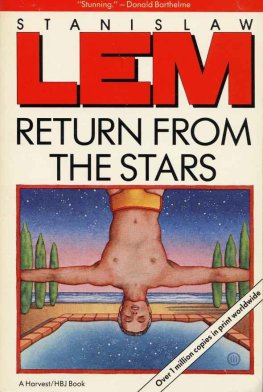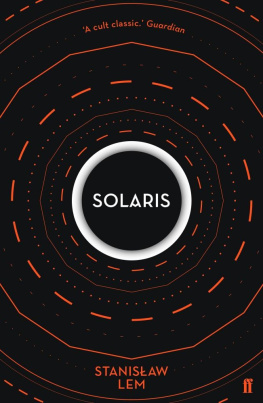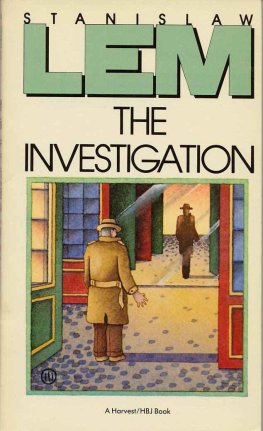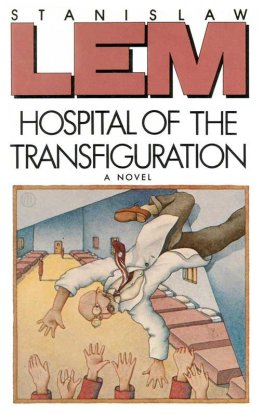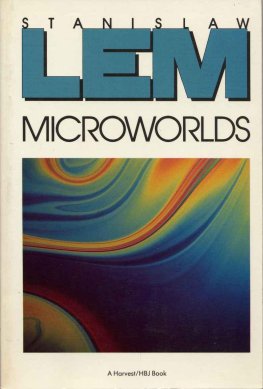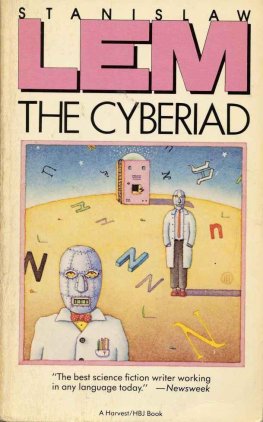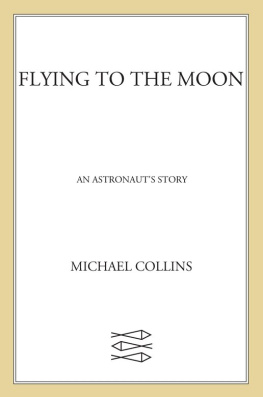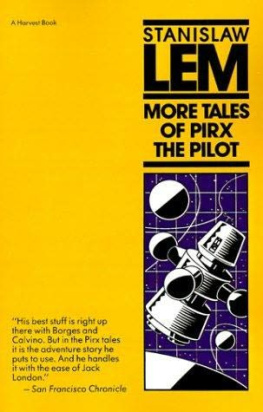On Patrol
by Stanislaw Lem
A red-shingled cottage, as yummy-looking as a raspberry gumdrop, stood on the floor of the little see-through box. One jiggle of the box and three little pigs came tumbling out of the bushes, so like three rosy-pink pearls. Simultaneously, a black wolf, its serrated, red-lined jaw chomping up and down at the slightest nudge, popped out of its hole by the foresta make-believe forest painted on the rear wall, but amazingly lifelikeand made a beeline for the pigs. (The wolf was probably magnetized.) Now, it took a pretty steady hand to head off a massacre. The trick was to maneuver the pigs through the cottage doornot the most obliging of doors, by the wayby tapping the bottom of the box with the nail of your little finger. The box was no bigger than a ladies compact, but challenging enough to consume half a lifetime. But at the moment it was as good as useless, due to the zero gravity. Pirx gazed down at the accelerator controls, wistfully. A flick of the finger, the barest amount of thrust, and he would have just enough gravity to tinker with the pigs destinywhich beat staring idly into space any day.
Regrettably, saving three rosy-pink piglets from an attacking wolf was not reason enough to justify activating the reactor, not according to the flying regs, anyway, which strenuously forbade any aimless maneuvers in space. Aimless, my foot!
Pirx reluctantly slipped the box back into his pocket. Other pilots before him had stowed even wackier things aboard, this being especially the custom on long patrol flights, such as the one Pirx was now on. There was a time when the Bases Flight Command used to wink at this splurging of uranium, which was used to launch not only manned spaceships but such personal items as toy windup birdsthe kind that feed on bread crumbsself-propelled hornets that chase after mechanical wasps, and nickel-plated Chinese puzzles inlaid with ivory. By now it was so commonplace that people had forgotten how it all began, that it was little Aarmens who first infected the Base with this mania when he started confiscating his six-year-old sons toys before going out on patrol.
The honeymoon lasted not quite a yearup until the time the ships stopped reporting back from their missions.
In those halcyon times, patrol duty was still a cause for bitching, just as being assigned to a space-combing mission was interpreted as a sign of the COs personal malice. Pirx, on the other hand, took the news completely in stride. Patrols were like a bout of the measles: sooner or later everyone was bound to get them.
Then Thomas failed to report backbig tubby Tom, who wore size 16 shoes, was always good for a gag, and who kept a bunch of poodles, the worlds smartest, of course. The pockets of his space suit were frequently home to hot-dog bits and sugar cubes, and the CO suspected him of occasionally sneaking the poodles aboard ship, though Thomas vehemently proclaimed his innocence. Maybe he was innocent, though the truth will probably never be known. Because one July afternoon Thomas embarked on a patrol missionhis lastloaded down with two Thermoses of coffee (he was also a coffee addict), and leaving behind a third in the pilots mess, filled to the brim, to make sure his favorite brew was waiting for him on his return: coffee mixed with grounds and boiled with sugar. The coffee was a long time waiting. The third day after takeoff, at 7:00 P.M., after the customary grace period had expired, Thomass name appearedall by its lonesomeon the control-room blackboard. Such things were a relic of the past; only the oldest veterans could recall a time when missions were aborted, and they loved to fluster the younger pilots with grim stories of the days when meteorite warnings came fifteen seconds before impactjust enough time for a pilot to say his good-byes. By radio, of course. But such stuff was now ancient history. The blackboard in the control room was always empty, a permanent fixture sustained only through the sheer force of inertia.
At nine oclock it was still light outside; the pilots on duty, having just emerged from the control tower, stood on the lawn surrounding the concrete landing strip, gazing skyward. The tower was declared off limits. That evening the CO drove back from town, fished the tapes out of the canistersthe ones with the signal recordings of Thomass automatic transmitterand went upstairs to where a glass-domed observatory gyrated in a madmans frenzy as it combed the skies with its black radar dishes.
Thomas was flying a small, one-man AMU, though its fuel supply was enough to propel the craft halfway around the Milky Way and back, as the NCO from the tanker squadron, a man unanimously regarded as a jerk, hastened to reassure the pilots. Up yours, pal, someone muttered the moment the NCO turned his back. Because the truth was the oxygen supply aboard an AMUa five-day ration, with an eight-hour emergency storewas a mere drop in the bucket, and everybody knew it. For four consecutive days, then, the stations eighty-some-odd pilots scoured the sector where Thomas was supposed to have disappeared, logging a total of nearly five thousand rocket hours. And each time they came back empty-handed, as if the man had simply vanished into space.
The second one to disappear was Wilmer, who, if the truth be told, was beloved by hardly anyone. Although there was no one major reason to account for his unpopularity, there was also no shortage of minor ones. He was forever butting into the conversation, not content unless allowed to have his say; he had a goofy laugh, a knack for cackling in the least appropriate places, and the more he got under your skin, the louder the cackle. Whenever he didnt feel like landing by the book, hed think nothing of setting his ship down on the lawn adjoining the landing field, incinerating grass, roots, and topsoil to a depth of one meter. But let anyone encroach on his patrol sector, by as much as a milliparsec, and right away hed report it, even if it meant ratting on a fellow rocket jockey from the Base. Not to mention a few other annoying habits, almost too petty to be mentioned, such as drying himself with other peoples towels, just to keep his own clean longer. The moment he failed to report back from patrol duty, however, Wilmer suddenly turned out to be a prince of a guy, a regular bosom buddy. Again the radar went berserk, the pilots were put on a round-the-clock shift, the flight controllers worked overtime, people took turns catnapping on a bench by the wall and had dinner brought upstairs; the CO, who was on vacation, flew back by special plane and ordered a four-day search mission, the Base morale having sunk so low by now that in retaliation for a single, lousy, imperfectly fitted rivet the men were ready to crack the skull of the mechanic responsible. Two commissions of experts came, an AMU-16a twin copy of the ship flown by Wilmerwas dismantled screw by screw, clock-fashion, but the results were nil: not a single defective part was found.
Although the sector measured 1,600 billion cubic kilometers, it was also thought to be a relatively tame one, undisturbed by any meteorite showers or the cold remnants of old comet tails, last seen hundreds of years agoall the more remarkable, considering that comets of that vintage have been known to disintegrate in the vicinity of Jupiter, in its perturbation mill, and later to discard pieces of their nucleus onto their former course. But the sector was as good as empty, unmarred by any satellites or asteroids, and least of all by the Belt. And just because it was so clean, no one had a hankering to patrol it.
Even so, Wilmers made the second disappearance in a row. His tape, which was played and replayed countless times, photocopied, blown up, and forwarded to the Institute, yielded as much information as Thomass: zilch. Sporadic signals for a while, then nothing. The signals sent by the transmitter had come at infrequent intervals, on the average of one per hour. Thomas had transmitted a total of eleven signals; Wilmer, fourteen. That was all.


